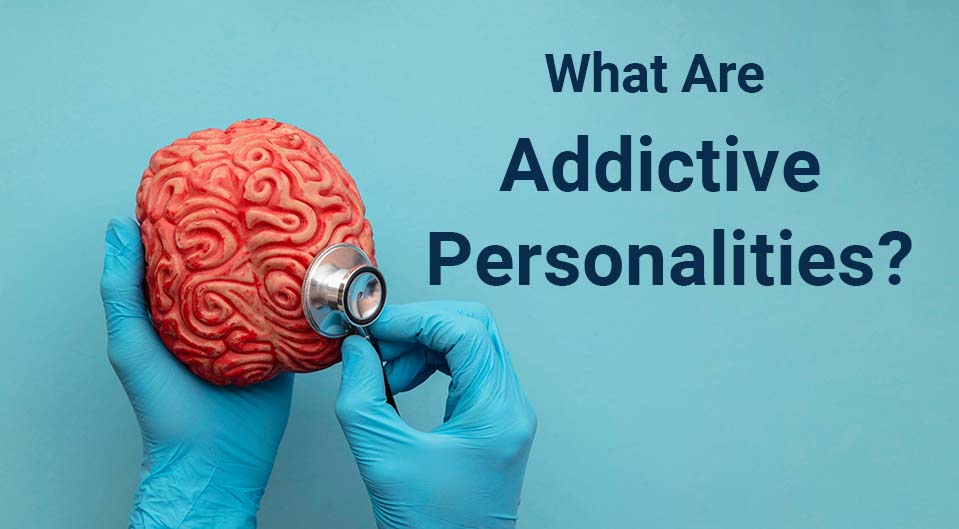When you think of addictive personalities, certain images might come to mind. Maybe you have a friend who can’t put their phone down and stop scrolling through social media. Or perhaps you personally find it difficult to disengage from work, even on weekends or holidays.
It’s true that addictive personalities can manifest in a variety of ways—from incessant exercise or playing too many video games to more dangerous activities like substance abuse. When addictive personalities lead to substance abuse, there can be negative and life-threatening consequences.
Addiction Center explains:
“An addictive personality is a personality that is more likely to become addicted to something. Some of these behaviors can be an attempt to heal unrealized or repressed emotions. At first glance being addicted to a video game or food can seem harmless, especially when compared to substance use disorders. The problem is the object of addiction can change. This means someone can have a phase of being addicted to video games, then transition into other objects — or substances — of abuse.”

What Are Addictive Personalities?
Most experts agree there is no one specific trait that is associated with or defines an addictive personality. However, individuals with certain personalities, beliefs, behaviors, co-occurring disorders, and even those who experience stresses or trauma can be more likely to suffer from addiction. (ASAM Definition of Addiction)
Certain traits are shared by people who have a higher risk of becoming addicted to psychoactive substances. If any of the following traits sound familiar, it’s important to be aware of how these traits might be impacting your life, particularly in terms of substance abuse.
Genetics Play a Role in Addiction
What you’ve heard is true: Addiction can run in families. The American Society of Addiction Medicine states in their definition of addiction that “genetic factors account for around half of the likelihood that someone will develop addiction.” This means that if you have a family member who has an addiction issue, you’re more prone to addiction, too.
At the same time, shared genes do not necessarily mean you’ll develop an addiction, nor does the lack of certain genetic markers mean you’re in the clear. There can be a variety of complex issues that contribute to addiction potential, such as environmental factors. Resiliencies acquired through parenting or life experiences also affect the extent at which genetic predispositions lead to addictions.

Issues With Mental Health
If you have an existing mental health condition such as depression, anxiety, or schizophrenia, your risk of addiction increases. Mental health issues can also disrupt a healthy social support system or harm personal relationships, both of which also play a role in many addictions. Without the proper support and treatment, it’s more likely that you’ll turn to alcohol and other substances to cope with your struggles.
The journal Alcohol Research Current Reviews reports that psychiatric disorders like anxiety and mood disorders commonly co-occur with alcohol use disorder (AUD). Among people with an alcohol addiction, depressive disorders are the most common psychiatric disorders.

Thrill-Seeking Traits
Risk-taking, adventurous types have a higher risk of addiction than others — and brain chemistry may be to blame. The reward center of the brain, which is also closely linked to memory and motivation, releases dopamine in response to pleasurable activities.
Research from The Journal of Neuroscience published by Science News confirms that higher levels of dopamine can lead to increased risk-taking. The study linked dopamine drugs like L-DOPA with risky behavior such as compulsive gambling in people with Parkinson’s disease.

For thrill seekers, the release of dopamine trains your brain to recognize what triggered the pleasant feelings. Was it a certain behavior, a substance, an activity, a food? Your brain seeks out the same circumstances to repeat the “rush” – and if it was a substance that seemingly provided those pleasant feelings, it’s more likely you’ll return to that substance repeatedly to feed your need for adventure.
Healthline explains that consistent substance abuse eventually leads to drug tolerance and overstimulation of the brain’s reward center as it pumps out dopamine. This means you’ll need more and more of the drug in order to feel the same effects.
Being Obsessive and Compulsive
People who tend to have rigid and habitual behaviors may be just as prone to substance abuse as those who lack impulse control. People with obsessive-compulsive disorder (OCD) may be overwhelmed with intrusive thoughts that compel them to engage in specific behaviors in order to satisfy the obsession.
These routines can be crippling and all-consuming, interfering with work, relationships, social activities, and responsibilities. For example, a person with OCD might wash their hands repeatedly, turn lights on and off a set number of times, or otherwise perform time-consuming rituals.
And over time, these rituals may lead to substance abuse; people with OCD tend to have higher than average rates of drug or alcohol addiction. The American Addiction Centers notes, “Substance abuse is often used as a way to ease the anxiety and internal tension of OCD, yet alcohol and drugs can actually make the symptoms of the disorder worse.”
There’s Help Available for Addictive Personalities
The same changes in pleasure and reward that occur in chemical addictions occur in people with behavioral addictions. Just as those with substance abuse disorders feel a sense of temporary relief when they drink or do drugs, people with behavioral addictions feel relief when they engage in their addictive behaviors.
Indeed, addictive personality traits tend to share a common denominator: an impaired sense of self-regulation. People with one or more of these traits tend to be unable to resist temptations and control their emotions and behaviors. Lack of self-regulation can lead to problems with addiction, eating disorders, gambling, and spending, among others.
Remember that having addictive personality traits does not necessarily mean you will become addicted to substances. However, because it puts you at higher risk, it’s important to recognize the signs of addictive personalities.

If you believe addictive personality traits are leading you toward substance abuse, get in touch with our experts at 12 South Recovery. We can help you identify the core issues and design an appropriate treatment path for your needs.
Call us or follow the links below to learn more about getting you or your loved one help for addiction.


















